News
EXPOSED! How two petroleum regulators failed to account for N313 bn – Audit report
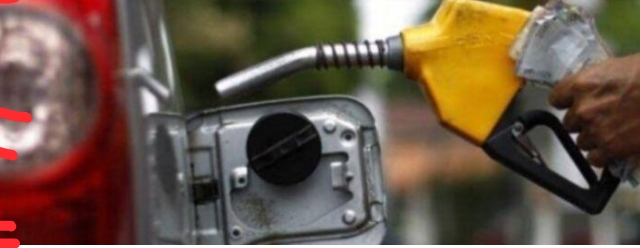
By Kayode Sanni-Arewa
The audit report details regulatory failures as well as disregard for due process and accountability standards.
Two agencies regulating Nigeria’s petroleum industry could not properly account for over N313 billion and their actions resulted in the loss of revenue to the government, according to the latest report by the Auditor General of the Federation.
The two petroleum agencies indicted in the report are the Nigerian Upstream Petroleum Regulatory Commission (NUPRC) and the Nigerian Midstream and Downstream Petroleum Regulatory Authority (NMDPRA).
The findings in the 2021 audit report, the latest by the auditor general, are interim observations requiring the regulators to provide explanations to the auditor general. However, even in cases where they provided explanations, the auditor general said some of their explanations were untenable.
The report detailed regulatory failures as well as disregard for due process and accountability standards.
Auditors said a total of N309 billion and $2.28 billion remained largely unaccounted for under the NUPRC and NMDPRA in 2021.
The two agencies were established in August 2021 following the signing into law of the Petroleum Industry Act by then-President Muhammadu Buhari. Gbenga Komolafe was appointed as the pioneer Chief Executive Officer of NUPRC in September 2021 and still holds the position, while Farouk Ahmed was appointed as the pioneer Chief Executive Officer of NMDPRA in September 2021 and still holds the position. Thus, the infractions occurred during the management of the agencies by both men.
The unexplained monies include outstanding royalties, non-payment of bridging allowances, and irregular balances in marketers’ indebtedness records.
Outstanding Royalties
Auditors observed that $1.65 billion was the outstanding Royalties payable by the Nigerian National Petroleum Corporation Limited (NNPCL) to the Department of Petroleum Resources (DPR) CBN account with respect to Production Sharing Contracts (PSC), Repayment Agreement (RA) and Modified Carry Arrangement (MCA) liftings as of 31 December 2021.
However, DPR only received $1.4 billion out of the $1.65 billion expected to be received, thereby, leaving an outstanding balance of $254 million as outstanding royalties for the period under reference.
Auditors said there was no reason provided for non-collection of the revenue arrears.
The non-collection of the revenue contravenes Paragraph 227 (i) of the Financial Regulation (FR), which states “Accounting Officers who are responsible for the collection of revenue will furnish annually a Return of Arrears of revenue due at the 31 December in each year which remains uncollected by the following 31 March. The return, which will be submitted by the 31 May, shall be prepared in triplicate, one copy each sent to the Accountant-General, and the Auditor-General while the third retained for record purposes. In cases where there is no outstanding revenue, a NIL return should be rendered. The Accountant-General will list in his Annual Report these departmental returns for the information of the Public Accounts Committee.”
Also, paragraph 227(ii) of the FR states that “It is the responsibility of Accounting Officers to follow up outstanding items of revenue and to take all necessary steps to ensure collection or, where collection is no longer possible, to apply to the Ministry of Finance for authority for a write-off, explaining the circumstances.”
The auditor general fears that this practice has resulted in the loss of revenue to the government and difficulty funding the 2021 budget.
In responding to the query raised by the auditor general, NUPRC said the outstanding revenue due from NNPC-COMD MCA/PSC as of 31 December 2021 has been paid to the tune of $224 million, leaving behind $29.6 million that is still outstanding. The management added that it is making efforts with the NNPCL to ensure the outstanding amount of $29.6 million is paid.
However, auditors said the management’s response failed to address the issue raised in its entirety (i.e., recovery of outstanding royalties due from the NNPC-COMD MCA/PSC). “Therefore, the findings remain valid to the extent that $29.6 million remained uncollected.”
Unjustified deductions by NNPCL
From the review of NNPC JV schedules and other documents, auditors observed that N204 billion was deducted by the state oil firm from the Oil Royalty assessed by the DPR for 2021.
The deductions by NNPCL include, among other things, priority projects, strategic holding costs, crude oil and product losses.
The auditor general said no justifiable reasons were provided for the deductions of the royalties by the NNPCL before remittance. The action is also in breach of Section 162 (1) of Nigeria’s Constitution.
In its response, NUPRC said the NNPCL makes deductions for government priority projects at source before remitting royalty to NURPC, with the latter having no control over this. Thus, NNPCL is in a better position to provide the necessary approvals to justify these deductions.
The regulator explained that the office of the Accountant General of the Federation has been duly written on the payment of 4 per cent Cost of Revenue Collection to NURPC for money deducted at source by NNPC for Government priority projects.
The auditor general, however, dismissed the explanation from the management of NURPC, saying it failed to address the issue raised (i.e. recovery of unjustified deductions from Joint Venture Royalty by NNPC).
The auditor general then directed the NUPRC CCE to recover the N204 billion and remit the same into the Federation Account. He added, “Henceforth, the CCE should ensure that amounts due for the Federation Account are not subjected to any deductions by Operators in the industry.”
Billions of dollars missing
From the review of the Revenue Ledger for 2021, audited documents observed that Oil Royalty amounting to $1.74 billion remained unpaid by some oil companies as of the end of December 2021.
Auditors said $13.8 million in revenue relating to royalty on gas sales (foreign) still remains outstanding as of 31 December 2021 while N48.2 billion was in arrears for gas royalty (local) for the same period.
According to the report, 23 operators also failed to pay $496 million, being outstanding Federation Account revenue relating to the Gas Flare Penalty, while 17 oil companies owed $7.68 million as outstanding concession rentals for the period of 2021.
The non-payment of oil royalties by these companies in 2021 was a denial of essential revenue to the federation account and violates extant financial regulations, the report said, adding that the above anomalies could also be attributed to weaknesses in the internal control system at NUPRC.
In responding to this specific issue, NUPRC said the operations in the oil industry are structured in such a way that most times there are time lags of about 60 to 90 days upon which the payment is expected to be effected by the operators from the oil revenue assessed.
Despite the lags, NUPRC said it is doing everything possible to ensure that operators pay their dues as soon as they become due and payable to the federation as provided by extant laws and operational policies in the industry.
The agency said it noted the recommendation made by the auditor general and efforts are in top gear to ensure that the amounts are fully recovered as recommended. “Letters have been written to the affected operators and payments are currently being made. A total of $4.9 billion and N494 billion have been collected between January and August 2022 from Operators representing largely part of the outstanding of the year 2021 and current dues of the year 2022,” NUPRC said.
Any payment of outstanding royalties and other fees from the operation are duly accounted for to the Federation as this has been the practice. The NUPRC has an existing internal control system, however, auditor’s observations and recommendations on the improvement have been noted for implementation.”
The auditors’ evaluation states that the response from the management of NUPRC failed to address the issue raised (i.e. recovery of outstanding royalties from Oil, Gas, Concession Rentals and Gas Flared payable by Operators to the Federation Account).
The auditor general requested the CCE of NUPRC to provide justification for non-payment of outstanding oil royalties amounting to $2.26 billion and N48 billion by the oil companies. He also wants the money to be recovered and remitted to the Federation Account.
Indictment of NMDPRA
Reviewing the books of the Nigerian Midstream and Downstream Petroleum Regulatory Authority (NMDPRA), auditors observed that N28.6 billion representing Bridging Allowances from the NNPCL Retail to the defunct Petroleum Equalization Funds (Management) Board, now the Authority, remained outstanding as of 31 December 2021.
Bridging allowance is not the authority’s revenue. It is meant for the reimbursement of transportation incurred by the marketers as a result of transporting petroleum products across the country.
A reconciliation was said to have been carried out between the NMDPRA and NNPC Retail to arrive at this figure for the fourth quarter of 2021. However, reconciliation statements and agreements/MoUs signed by the parties during reconciliation meetings were not produced for auditors to scrutinise.
“Reasons for delay remittance of the bridging claims, strategies in remitting the balance as well as efforts by the Board in ensuring speedy recovery of the revenue arrears were not provided for audit review,” auditors said.
In addressing the concerns of the auditor general, the NMDPRA said reconciliations between NMDPRA and NNPC Retail are a continuous process. “For the period under review, NNPC Retail remitted the N7 billion out of the outstanding bridging allowance which has subsequently been utilized for marketers’ payment.”
The auditor general said the response from the petroleum authorities failed to address the issue raised (i.e. recovery of outstanding bridging allowance from NNPC Retail).
“Therefore, the findings of the report remain valid and the Authority Chief Executive should “recover the outstanding N28.6 billion bridging claims from the NNPC Retail for 2021 and remit same to the Federation Account,” the auditor general said.
Outstanding bridging allowance claims from oil marketers
Auditors also observed from the review of bridging allowance receivables that N13.5 billion, representing bridging claims from three major marketers to PEF(M)B, remained outstanding as of the 4th quarter of 2021
Audited documents show that reconciliation was held between the NMDPRA and major marketers before arriving at these figures for quarter four of 2021 without producing records like minutes of the reconciliation meetings, attendance and Agreement/MoU signed by the parties at the reconciliation meetings.
“Reasons for the delayed remittance of the bridging claims, strategies in remitting the balance as well as efforts by the Board to ensure speedy recovery of the revenue arrears were also not provided for audit review.”
In its response, the NMDPRA said in an effort to recover all outstanding bridging allowances from marketers, it has set up a taskforce.
“Reconciliation is also ongoing for Mobile (11 PLC) and Total PLC bridging allowance,” it added, noting that these measures are put in place by the management of the agency to ensure that all outstanding allowance is fully recovered.
However, the auditor general said the response from the management failed to address the issue raised. Therefore, the findings remain valid. The auditor general also wants the agency to recover the 2021 bridging claims of N13.5 billion from the major marketers and remit the same to the Federation Account.
Irregular balances in marketers’ indebtedness record
The audit observed that balances from six marketers’ indebtedness records, as submitted, were irregular and inaccurate, as the same balances computed by the audit revealed different figures.
While the total balance due from the indebtedness of the six marketers was submitted as N15.4 billion, audit computation revealed a total of N16.4 billion, resulting in a variance of N1.08 billion and no justifiable reasons were provided to allude to the said variance.
The regulator acknowledged the error in its response to the auditor general. However, it said the discrepancy is due to the date of cut-off and recognition. “Also, note that reconciliation is intertwined between bridging allowances and marketers’ payment (claims) through ticketing and batching subsequent payments. This can create a variance as of the date of recognition.”
“Management notes the variance and will reconcile with the audit unit to adjust for the differences established. The taskforce is reconciling with all DAPPMA Marketers for the recovery of all outstanding Bridging Allowance.”
The auditor general said the response from the management failed to address the issue raised. “Therefore, N1.08 billion should be recovered from the marketers and remitted to the Federation Account.”
More billions missing
Audit observed that balances from twenty (20) marketers’ indebtedness records, as submitted, amounting to N14.1 billion remained outstanding without any payment made by the marketers during the accounting year 2021.
Efforts made by the accounting officers to follow up on outstanding items of revenue and necessary steps to ensure collection of the funds were not provided.
The petroleum regulator said regular meetings were being carried out by the management, taskforce, PPMC and Major and DAPP Marketers on the recovery and timely remittances of outstanding bridging allowance.
The auditor general’s evaluation of the response states that management failed to address the issue raised (i.e. recovery of indebtedness by some DAPPMAN Marketers).
“Therefore, the agency should recover the outstanding indebtedness of N14.1 billion from the 20 Marketers and remit same to the Federation Account.”
News
Nigeria Felicitates with South Africa on 31st Freedom Day Anniversary

By Gloria Ikibah
Nigeria has congratulated South Africa on the celebration of its 31st Freedom Day anniversary, marking more than three decades since the end of apartheid rule.
This was contained in a statement issued by the Ministry of Foreign Affairs, on Sunday in Abuja, the Minister, Ambassador Yusuf Maitama Tuggar, extended warm greetings to his South African counterpart, His Excellency Ronald Lamola, Minister of International Relations and Cooperation.
Ambassador Tuggar described the day as a reminder of the historic victory of democracy over apartheid and a celebration of the resilient and unified spirit that continues to shape South Africa’s journey.
“Nigeria and South Africa share a profound bond forged through decades of solidarity in the liberation struggle. As we reflect on this milestone, we recall Nigeria’s unwavering support for the anti-apartheid movement, including diplomatic, material, and moral contributions that underscored our commitment to justice and the ethos of pan-Africanism,” the statement read.
Highlighting the strong bilateral ties between the two countries, Tuggar emphasized the shared responsibility Nigeria and South Africa have in promoting peace, security, and inclusive development across the African continent.
He noted that as Africa’s two largest economies and democracies, there is a need to strengthen collaboration in areas such as trade and investment through the African Continental Free Trade Area (AfCFTA), as well as cultural exchanges and youth empowerment.
“Therefore, on this Freedom Day, we stand with South Africa in honouring the sacrifices of heroes like Walter Sisulu, Nelson Mandela, Govan Mbeki, Thabo Mbeki and recommit to working together to realize the vision of a prosperous, peaceful, and united Africa,” he added.
News
Enugu Reps caucus backs concessioning of Enugu airport
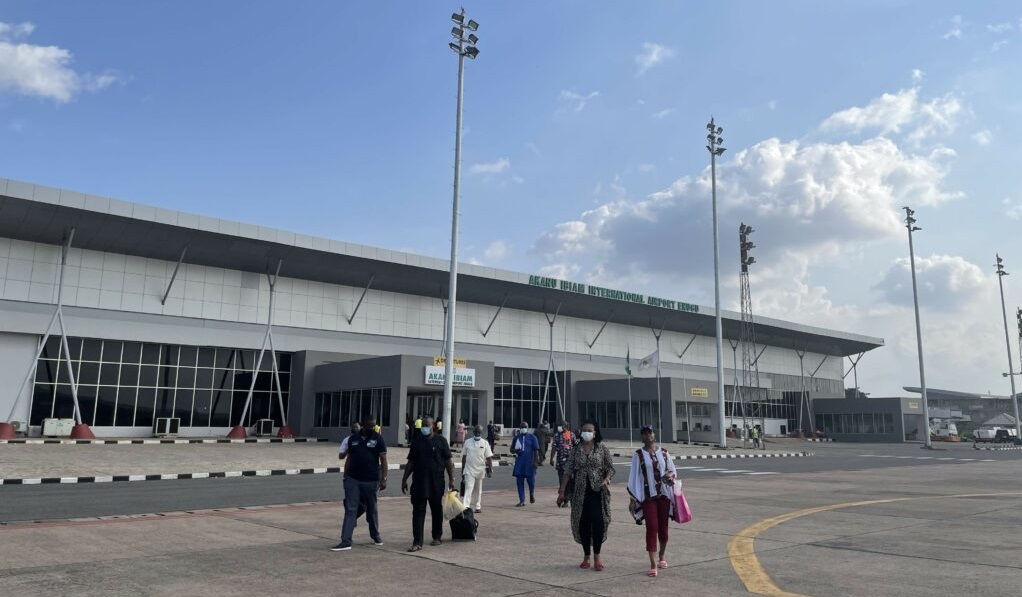
The Enugu Caucus in the House of Representatives has thrown its weight behind the Federal Government’s plan to concession the Akanu Ibiam International Airport, Enugu, describing it as a potential catalyst for the Southeast economy.
The caucus commended the Federal Government for the initiative and urged it to hasten the process to enable the people of the Southeast and the nation to benefit from it in earnest.
It also called on the people of the region to support the concession as the only way to guarantee sustainable investment to fully develop the airport into a truly international facility.
News
Vatican: Conclave to elect a new pope will start on May 7
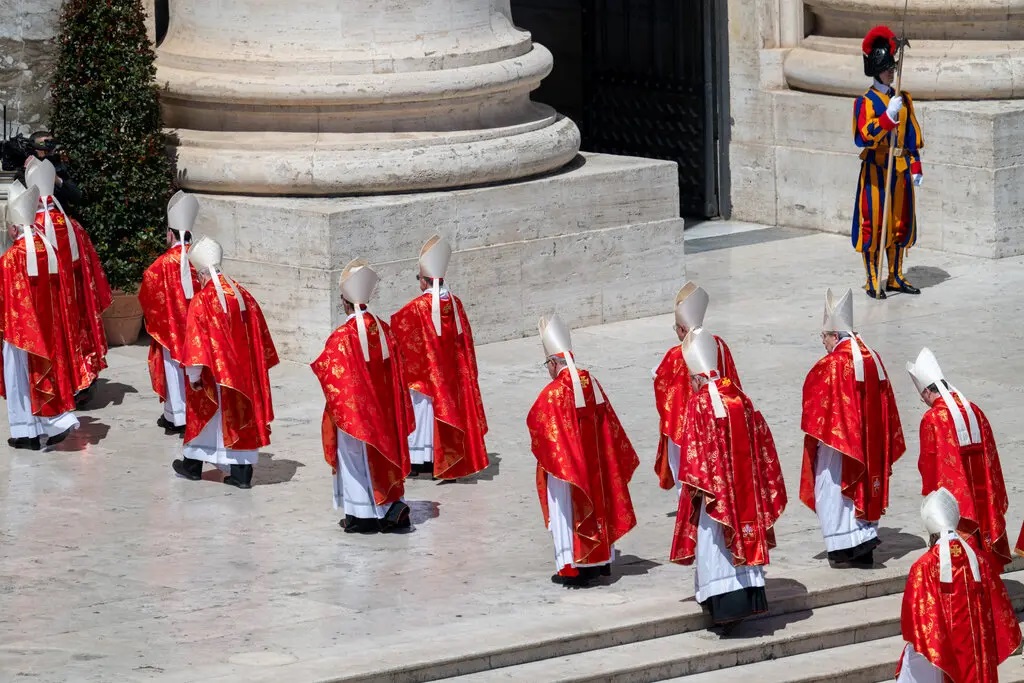
Cardinals will meet next month in a secret conclave to elect the next pope, the Vatican has said.
The closed-door meeting will start inside the Sistine Chapel on 7 May and will involve some 135 cardinals from across the world.
It follows the death of Pope Francis who died at the age of 88 on Easter Monday and whose funeral was held on Saturday.
There is no timescale as to how long it will take to elect the next pope, but the previous two conclaves, held in 2005 and 2013, lasted just two days.
Vatican spokesman Matteo Bruni said cardinals will take part in a solemn mass at St Peter’s Basilica, after which those eligible to vote will gather in the Sistine Chapel for the secretive ballot.
Once they enter the Sistine Chapel, cardinals must have no communication with the outside world until a new Pope is elected.
There is only one round of voting on the first afternoon of the conclave, but the cardinals will vote up to four times every day afterwards.
A new pope requires a two-thirds majority – and that can take time.
Each cardinal casts his vote on a simple card that says, in Latin: “I elect as Supreme Pontiff” to which they add the name of their chosen candidate.
If the conclave completes its third day without reaching a decision, the cardinals may pause for a day of prayer.
Outside the Sistine Chapel the world will be watching for the smoke from the chimney.
If the smoke is black, there will be another round of voting. White smoke signals that a new pope has been chosen.
On Saturday, politicians and royalty joined thousands of mourners as Pope Francis’ funeral was held in St Peter’s Square.
Hymns played out on giant speakers, occasionally drowned out by the sound of helicopters flying overhead, before 91-year-old Cardinal Giovanni Battista Re gave a homily on the pope’s legacy.
After a ceremony, huge crowds lined the streets of Rome to watch as the Pope’s coffin was carried in a procession to his final resting place, Santa Maria Maggiore Basilica.
Authorities said 140,000 people had lined the streets, clapping and waving as the hearse – a repurposed white popemobile – crossed the Tiber river and drove past some of Rome’s most recognisable sights: the Colosseum, the Forum and the Altare della Patria national monument on Piazza Venezia.
On Sunday images of Pope Francis’s tomb at the church were released showing a single white rose lying on the stone that bears the name he was known by during his pontificate, below a crucifix illuminated by a single spotlight.
-

 News11 hours ago
News11 hours agoJust in: Senator Natasha tenders satirical ‘apology’ to Akpabio
-

 News5 hours ago
News5 hours agoInsecurity: BUDA urges govt to quickly rescue Baruten from terrorists
-

 News7 hours ago
News7 hours agoUNUSUAL! Without invitation, Police declared me wanted — Daughter of ABC Transport owner
-
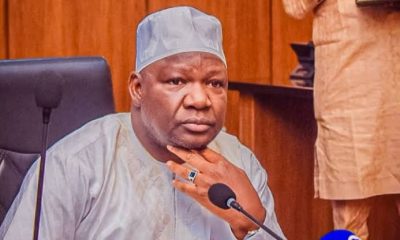
 News3 hours ago
News3 hours agoWeeks to 2nd anniversary, Niger deputy gov, plans to resign, move out personal effects
-
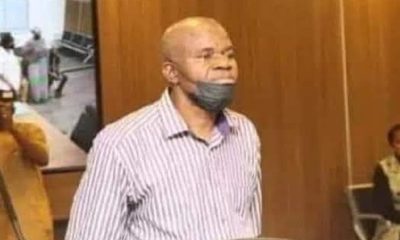
 News2 hours ago
News2 hours agoBreaking: Late gospel singer Osinachi’s husband sentenced to death by hanging
-

 News19 hours ago
News19 hours agoBenue LG chairman gives Fulanis 48hrs to leave all farmlands
-

 News20 hours ago
News20 hours agoFive suspected kidnappers eliminated by police in Delta
-

 Metro12 hours ago
Metro12 hours ago‘My husband always makes love throughout the night until morning’ – Woman Wants Divorce


















